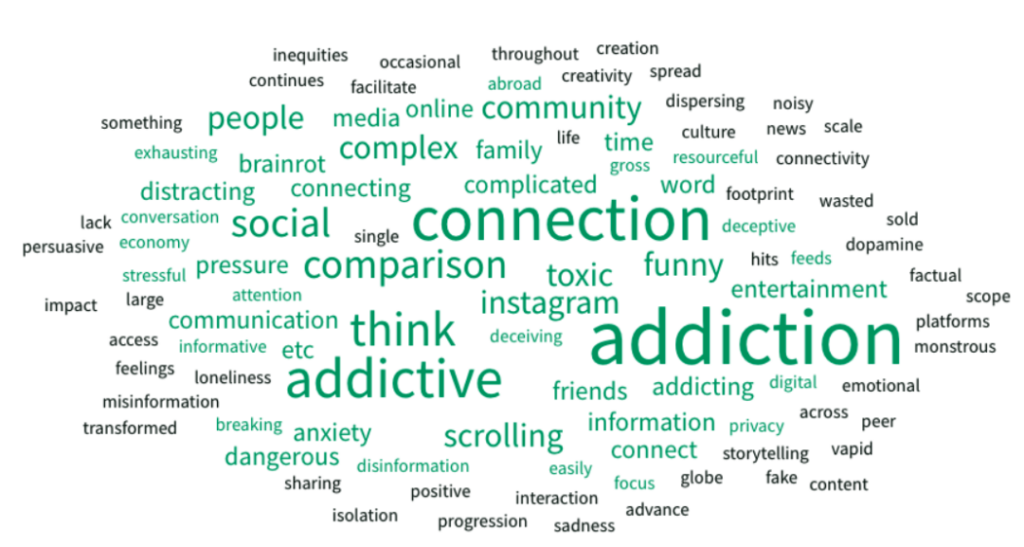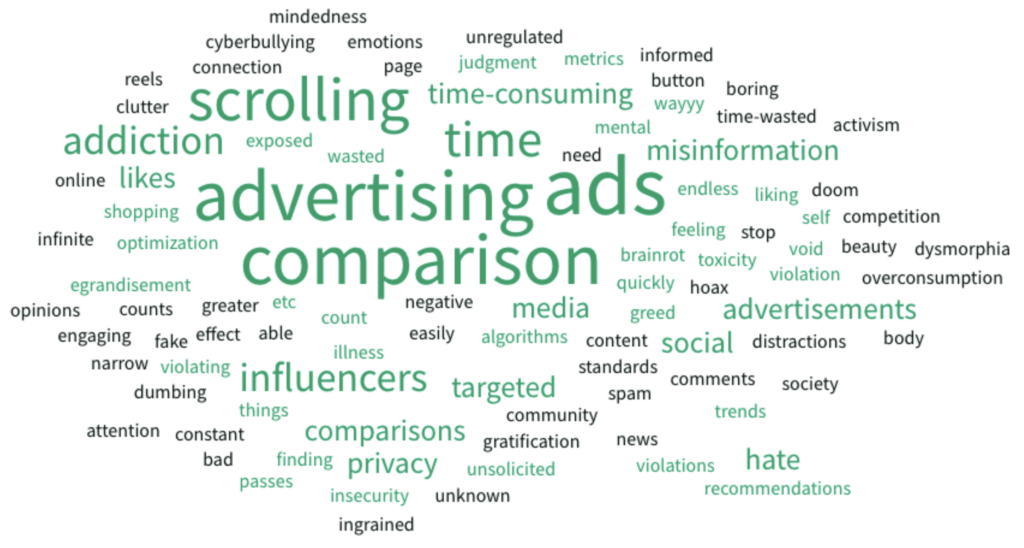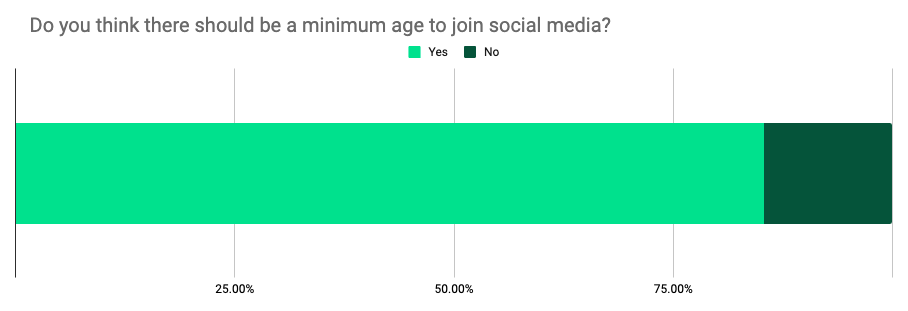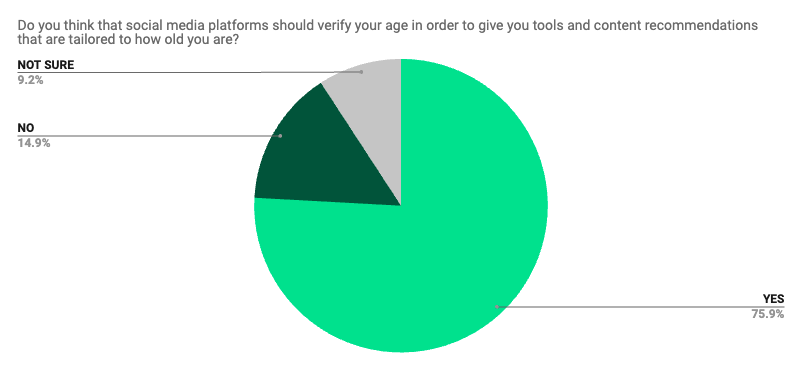Design It For Us Campus Tour Poll
SEPTEMBER – OCTOBER 2024
INTRODUCTION
We’re the guinea pigs: the generation that grew up on social media. It has had profound impacts on our lives, in positive and negative ways. Now it’s time to ask ourselves what’s working about our digital experiences and what isn’t. Design It For Us — a coalition of youth activists — traveled across the country on a campus tour to speak to and meet with college students. This tour offered students the opportunity to address the human and shared experiences of growing up entirely on social media and created conversations in their college communities to think critically about these technologies and their lasting impact. Design It For Us captured the momentum of the tour and built opportunities from these conversations for young people to join the growing movement of youth activists speaking about their lived experiences on social media.
Using this community-centered and legislation-agnostic approach, Design It For Us also has the opportunity to produce a vision for what young people want when it comes to a better online environment. After hosting panel conversations and facilitating discussion amongst students at five key locations, Design It For Us asked attendees to participate in an interactive poll that invited attendees to share their opinions, perspectives, and voices.
Tour Highlights
| Campuses Visited | Miles traveled | Attendees | Student Press Hits | Percent Growth of New Members |
| 5 | 3.2k | 280+ | 3 | 20% |
ABOUT THE POLL
Using Poll Everywhere, attendees completed a poll immediately following the conclusion of the panel discussion at each event. Attendees were asked to scan a QR code on the screen and complete a 13-question poll. The questions were written by Design It For Us leaders and were primarily qualitative in nature. Attendees’ responses to each question appeared on the screen in real-time and Co-Chair Arielle Geismar discussed the results of the poll with attendees after they had completed it. Attendees were asked the same 13 questions at every stop along the tour and were only permitted to submit one entry each. Questions focused on a variety of topics related to responsible technology, social media, and lived experience. Attendees were asked to submit their responses in forms such as single-answer, free-response, multiple-choice, and checkbox answers. Over the course of the tour, we were able to poll 91 attendees, mostly aged 18-21. The methodology presented some limitations, including that attendees were able to leave while the administration of the poll was underway, such that not all participants answered each question to completion. In addition, while most attendees were students, some (less than 10) panelists and attendees who completed the poll are over the age of 26.
KEY FINDINGS
- Young people use the words “connection” and “addiction” to describe what they think of social media.
- Young people overwhelmingly described the most valuable part of social media as “connection” (23%) followed by “information” (5.2%) and “friends,” “people,” and “community” (4.4%).
- Young people differ in what they find to be the least valuable parts of social media, including ads/advertising, comparison, and scrolling.
- Young people overwhelmingly believe there should be a minimum age for social media (85.4%), but are split on what that age should be. 17.7% believe the minimum age should be age 13, 17.7% believe it should be age 16, and 21% believe it should be age 18.
- Young people are split on whether the choice of more social media platforms would change how they use social media. 49.4% of respondents answered “Yes” while 42.4% said “No.”
- An overwhelming majority of young people (75.9%) believe social media platforms should verify the age of their users in order to offer them age-appropriate tools and content recommendations.
- Young people were split on whether there should be restrictions in schools for phone usage. 44.3% said that schools should decide, 27.3% parents and kids should decide, 20.5% said teachers should decide, and 8% said the government should decide. 0% of young people said none of these groups should decide.
- Young people used words like “less,” “regulated” and “safe” to describe what they want social media to be like in 3 years.
RESULTS & ANALYSIS
1. Young people use words like “connection” and “addiction” to describe words that come to mind when they think of social media. We asked young people what word comes to mind when they think of social media. 4.7% of respondents used the word addiction and 3.7% used the word connection. Other descriptors generally reflected the challenges of growing up in the digital age – young people also described social media or their experiences with social media as “complex” and “complicated.”

2. Young people overwhelmingly described the most valuable part of social media as “connection” (23%), followed by “information” (5.2%) and “friends,” “people,” and “community” (4.4%). When asked what the most valuable part of social media is to them, young people overwhelmingly offered “connection” as the word that most immediately came to mind. This tracks closely with Pew Research Center’s polling that found young people find value in social media when it allows them to connect with their friends.1

3. There’s no universal experience online for young people. When asked for a current and ideal outlook on how young people feel using social media, responses greatly varied. 16 respondents reported wanting social media to make them feel “inspired,” suggesting that they do not currently feel that way using social media. Other responses spoke to the pressures of being a young person today including “anxious,” “FOMO” (fear of missing out), and “mental fog.” In turn, respondents said they wished they felt “not stuck,” “at peace,” and “productive.” Common responses included:
| When I’m scrolling on social media, I feel ___ | and I want to feel __. |
| Numb Unproductive Emptiness Anxious FOMO Mental fog Like I’m wasting time | Inspired Creative Better Happy Not stuck At peace Productive |
4. Young people differed in what they found to be the least valuable parts of social media including ads/advertising, comparison, and scrolling. As platforms have continued to become more personalized, young people have become inundated with new design features, suggested content, and constant notifications. In our polling, young people have underscored that feelings of comparison are particularly harmful. This closely tracks with documents brought forward by Facebook whistleblower Frances Haugen, who highlighted that according to Instagram’s own presentations, “comparisons on Instagram can change how young women view and describe themselves.”2 Haugen was a featured speaker at our Columbia University event.

5. Young people proposed an array of different changes they think would make social media better. Many of the respondents’ answers were grounded in a desire for more user agency.
| Social media would be better if: The companies’ singular incentive for action was not profit. Student, American University |
| Social media would be better if: The way we engaged with it was more aligned with proven positive aspects of embodied experience. Which is to say, that it keeps us thinking and rethinking actively and critically, that we give caring feedback to one another. Student, Columbia University |
| Social media would be better if: You would be able to entirely curate your feed – your FYP [for you page] would not add videos you might not be interested in just to keep you engaged. Student, Stanford University |
| Social media would be better if: There was no measure of likes or success or interactions and more regulation on who can access the internet and what can be posted. Student, University of North Carolina, Chapel Hill |
| Social media would be better if: I could control which features or types of content I could use at different time[s]. Student, New York University |
| Social media would be better if: I had more choice. Student, Stanford University |
6. Young people underscored that their proposed changes for improving social media as offered in question 5 would give them more control both in their real-life experiences and online interactions.
How do you feel this change would make your life better?
| I would feel more comfortable and confident in my social media usage. |
| I’d be able to stay in touch with my friends and family abroad instead of doom-scrolling. |
| I think corporate companies need to be accountable for what they do in the interest of the society. When that happen[s], I will feel comfortable and safe when using social media. |
| More people would talk to each other and not scroll on their phones while waiting in line, riding a train, etc. |
| I would feel like I have greater autonomy. |
7. When asked “Is there a tool or feature you wish social media had?,” some young people readily proposed opportunities to improve online experiences, while others were unsure. Generally speaking, we don’t believe that the onus should be on young people to develop new tools to keep them safe and productive online. But given the distinct vantage points and vast experiences that growing up fully online provides, young people have a unique insight into how social media could be designed for us. Some proposals included:
| Turning off the reel feature on apps like YouTube and Instagram, and keeping only long-form videos or photos. | I wish it had a way to better protect private data like disclosing what companies your data is being sold to | I wish social media had the ability for me to block certain content I don’t want to see and select more of what I want to see |
| Privacy restrictions, more data control | Ability to turn off the algorithm, feeds of people I choose to follow | Fact checker |
8. Young people overwhelmingly believe there should be a minimum age for social media (85.4%), but are split on what that age should be. 17.7% believe the minimum age should be age 13, 17.7% believe it should be age 16, and 21% believe it should be age 18. A federal law currently requires social media companies to keep anyone aged 13 and under off social media. But as platforms have evolved, there is little agreement on what that age should be. A recent best-seller from NYU Professor Jonathan Haidt calls for 16 to be the minimum age for social media.3 Meanwhile, Australia is considering banning social media but hasn’t yet determined an exact age between the range of 14 to 16.4 New York has passed legislation that would ban algorithms for social media accounts under the age of 18.5 As for the platforms, TikTok and Meta have allowed users under the age of 13 to create accounts without taking action.6 7


9. Young people are split on whether the choice of more social media platforms would change how they use social media. 49.4% of respondents answered “Yes” while 42.4% said “No.” 8.2% said “Maybe.” After Google was found guilty of illegally maintaining a monopoly,8 we posed this question to young people in order to understand how young people think about social media from the perspective of markets, companies, and competition. Young people responded that they want to be able to have more choice [see Question 5], but were evenly split on whether that choice would change how they used social media. Many young people who responded “No” said that they would want to be on platforms wherever their friends were. In our post-poll discussions, young people fondly offered BeReal, an app framed as an alternative to Instagram. Some young people explained that they enjoyed using the app, but ceased using it because their friends stopped using the app. It could be assumed that the less addictive nature of the app failed to compete with larger platforms that leveraged addictive design features to keep users hooked to their products.

10. An overwhelming majority of young people (75.9%) believe social media platforms should verify the age of their users in order to offer them age-appropriate tools and content recommendations. We asked young people to consider whether platforms should verify age to offer tools and content recommendations, not simply to get on social media. Given the nature of social media today, young people are overwhelmingly looking for structural support. Throughout the tour, young people shared that they were underage when they first joined social media platforms and would lie about their age to get on social media. That appeared to be a common experience for young people across the tour, primarily because their peers also had access to social media. When young people join social media, platforms can concretely verify age, but risks are associated with age-verification technologies that could harm marginalized communities.9 While age verification has risks, age assurance technologies are possible which international NGO, 5Rights, has assessed in an October 2021 report.10 Some state and federal legislation proposed over the past few years would require platforms to develop age estimations of their users in order to provide users different “age-appropriate” experiences.

11. Young people were split on whether there should be restrictions in schools for phone usage. 44.3% said that schools should decide, 27.3% parents and kids should decide, 20.5% said teachers should decide, and 8% said the government should decide. 0% of young people said none of these groups should decide. Schools, educators, and states are grappling with how to preserve productive environments in the classroom. We polled young people on who should decide what kind of restrictions should be placed on phone usage in schools. The plurality of respondents agreed it should be schools deciding, but others felt that teachers or parents and kids themselves should decide. The data underscores the split in opinions among stakeholders across the country when determining how to deal with this issue. Notably, no respondent across all five tour stops believes that none of these groups should play a role.

12. We asked young people what their message is for social media platforms:
| I hate how much effort you put into wasting my time. Student, American University | If you design a digital casino, you should be prepared to deal with the long term side effects of gambling with your mental health. Student, University of North Carolina, Chapel Hill | They’re ruining society. Student, Columbia University |
Social media is a great place to express yourself where you many [n]ot be able to in real life, but we need to make it more safer and authentic too. Student, Stanford University | Our identities should not be revenue streams. Student, American University | You’re teaching young people to not have control over their lives. I know so [many] kids who grew up to[o] young, they can’t get those years back. Student, Stanford University |
| Their products have isolated more people than ever, made more people more depressed than ever, ruined the attention spans of all users, and inundated us with useless information. Student, Columbia University | The consequences of harm outweigh their bottom line of revenue. Student, New York University | There’s a line between profiting the most off of a business model and protecting consumers rights, especially the young people that use it most. Student, American University |
13. Young people used words like “less,” “regulated” and “safe” to describe what they want social media to be like in 3 years. Overall, young people conveyed a cautiously optimistic view about the future of social media, while some expressed a desire to see it “banned” or “obsolete.” Many who conveyed a desire to see safer social media also underscored the need for regulation. In our discussions with young people following the administration of our poll, attendees did not feel that they could trust social media platforms to improve on their own. Many felt that government regulation was necessary to improve social media for younger users.

1 https://www.pewresearch.org/short-reads/2023/04/24/teens-and-social-media-key-findings-from-pew-research-center-surveys/
2 https://www.wsj.com/articles/facebook-knows-instagram-is-toxic-for-teen-girls-company-documents-show-11631620739
3 https://www.axios.com/2024/03/22/kids-childhood-smartphone-ban-social-media
4 https://www.reuters.com/technology/australia-plans-social-media-ban-children-2024-09-09/
5 https://abcnews.go.com/Business/landmark-new-york-bill-restrict-social-media-children/story?id=110809032
6 https://www.theguardian.com/technology/2023/dec/19/tiktok-allowing-under-13s-to-keep-accounts-evidence-suggests
7 https://nypost.com/2023/11/27/business/millions-of-underage-instagram-users-are-an-open-secret-at-meta-lawsuit/
8 https://www.nytimes.com/2024/08/13/technology/google-monopoly-antitrust-justice-department.html
9 https://www.scientificamerican.com/article/online-age-verification-laws-privacy/
10 https://5rightsfoundation.com/wp-content/uploads/2024/09/But_How_Do_They_Know_It_is_a_Child-1.pdf